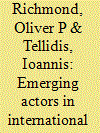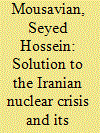|
|
|
Sort Order |
|
|
|
Items / Page
|
|
|
|
|
|
|
| Srl | Item |
| 1 |
ID:
135284


|
|
|
|
|
| Summary/Abstract |
Emerging actors in peacebuilding are generating a slow transformation of the norms and praxes of international peacebuilding, statebuilding, and development. Although each of the emerging donors have different contexts, approaches, motives, and methodologies, their power, influence, and—crucially— their nonadherence to the principles of the Development Assistance Committee of the Organisation for Economic Co-operation and Development have attracted scepticism and criticism from traditional donors. This article highlights the nuances of donors' engagement with peacebuilding and statebuilding. It examines whether they are critical or status quo states and what the implications are for practices of intervention.
|
|
|
|
|
|
|
|
|
|
|
|
|
|
|
|
| 2 |
ID:
135281


|
|
|
|
|
| Summary/Abstract |
The global nuclear regime may have reached a crossroads: the states parties to the Nuclear Non-Proliferation Treaty have called for the establishment of a zone free of nuclear weapons and other weapons of mass destruction and their delivery systems in the Middle East. Now that Iran and the five permanent members of the UN Security Council plus Germany have reached a deal in Geneva over a phased verification of the peaceful character of Iran's nuclear program, the international community needs to address broader regional issues. Failure to move forward could imperil the global nonproliferation architecture. At the same time, little thought has been given to how this regional arrangement would work both internally (with its member states) and externally (with other organizations such as the International Atomic Energy Agency). This article reviews the obstacles and windows of opportunity for a comprehensive regional nuclear settlement by drawing lessons from recent history in Europe. In particular, the history of the European Atomic Energy Community suggests how a future regional organization with jurisdiction in all aspects of nuclear development should articulate its functions with existing international organizations such as the IAEA. In Europe, regional institutions have played a crucial role in creating trust among former warring nations and in harmonizing the regional and global nuclear orders. A EURATOM-like organization would be a great step for the Middle East and a great model for other regions that must deal with issues of global legal complexity (e.g., how they can harmonize regional and global orders so that they can pursue the same goals with different but compatible means).
|
|
|
|
|
|
|
|
|
|
|
|
|
|
|
|
| 3 |
ID:
135286


|
|
|
|
|
| Summary/Abstract |
With China increasing its financing of Africa's development, roles have shifted and new roles are being assigned. The World Bank, having been for many years a prime and essentially unchallenged financier of Africa's development, is under pressure to reconsider its policies vis-à-vis African members. Two Chinese banks have been highly instrumental in this trend—the China Development Bank and the Export-Import Bank of China. According to various estimates, over the past few years these two banks combined have lent more money to developing countries than the World Bank. This article explores in a comparative fashion a range of features of the World Bank and Chinese policy banks' practices in Africa. It argues that, even though such a comparison is methodologically problematic, the current dynamic is going to affect the norms of governance represented by the World Bank and its lending policies toward Africa.
|
|
|
|
|
|
|
|
|
|
|
|
|
|
|
|
| 4 |
ID:
135282


|
|
|
|
|
| Summary/Abstract |
Now that a number of Arab countries have serious plans to invest in developing nuclear power, the regionalization of the nuclear fuel cycle in the Arab region might present some important advantages, including better coordination, economies of scale, effective regional control, and the strengthening of nonproliferation norms, which may yield positive influence on the establishment of a zone free of nuclear weapons and of other weapons of mass destruction and their delivery systems in the Middle East. In addition, the bridges created across the gap between developed and less developed partners could lead toward greater political integration in the region, out of which a broader regional architecture for peace could emerge. This article addresses the following key question: if the Arab countries were to take the step of inviting Iran to join a Middle East nuclear fuel cycle from the outset, including Iran's sensitive nuclear technologies, would such a step open the way for a peaceful settlement of the Iranian nuclear crisis? If Iran kept control of its nuclear program under the umbrella of a Middle Eastern nuclear fuel cycle, then Iran's peaceful nuclear accomplishments could be put to the service and benefit of all the Arab members of the region without necessarily leading to any transfer of sensitive technologies beyond Iran. To draw a road map toward the establishment of a WMDFZ in the Middle East, this article draws on lessons from previous experiences, especially the European Atomic Energy Community Treaty, in establishing a regional cooperation framework.
|
|
|
|
|
|
|
|
|
|
|
|
|
|
|
|
| 5 |
ID:
135285


|
|
|
|
|
| Summary/Abstract |
De facto states are regarded as political authorities functioning within a certain territory without international legal recognition. However, de facto states aim to gain the recognition of other states in order to be considered legitimate actors in the international system. There are two main contending approaches that attempt to explain the factors motivating third-party states' recognition behavior. The realist approach argues that national interest shapes the recognition strategy of third-party states while the liberal argument highlights the role of democracy in the recognition process. This article tests the validity of hypotheses derived from these two approaches through an examination of third-party states' levels of democracy and data regarding their recognition of de facto states since 1991.
|
|
|
|
|
|
|
|
|
|
|
|
|
|
|
|
| 6 |
ID:
135283


|
|
|
|
|
| Summary/Abstract |
After a decade of failed nuclear negotiations between Iran and the five permanent members of the UN Security Council plus Germany (P5+1), they have finally fleshed out a temporary agreement that will hopefully restore trust in the peaceful character of Iran's nuclear program among all parties. To do so, the temporary agreement must become the basis for renewed discussions on a final deal and the contours of a regional nuclear order in the Middle East. In a broader sense, the outcome of the nuclear negotiations with Iran will have a profound impact on nuclear nonproliferation, a nuclear weapons−free zone (NWFZ), and a zone free of nuclear weapons and of other weapons of mass destruction and their delivery systems (WMDFZ) in the Middle East. This article examines the consequences of the breakthrough in nuclear talks between Iran and the P5+1. A negotiated settlement will be based on the framework of the Nuclear Non-Proliferation Treaty, with measures to address key demands from all parties involved. For the P5+1, this includes transparency and verification over the nature of the Iranian nuclear program, ensuring there will be no breakout. Iran's main demand includes respecting its rights under the NPT, including enrichment and lifting sanctions, as negotiated in the November 2013 interim agreement between it and the P5+1. Furthermore, a permanent settlement on the Iranian nuclear issue will inevitably introduce modified and newly formulated measures and technical modalities at the regional level, which will enhance nonproliferation efforts. These milestones, which are described in this article, will pave the way toward strengthening the call for concerted efforts to realize a WMDFZ in the Middle East and will help preserve the global nuclear nonproliferation regime in the future.
|
|
|
|
|
|
|
|
|
|
|
|
|
|
|
|
|
|
|
|
|